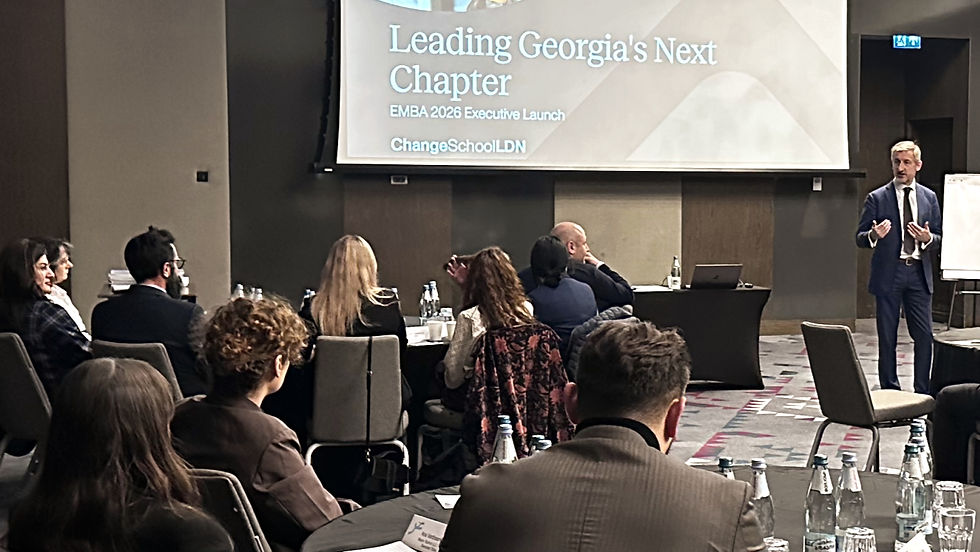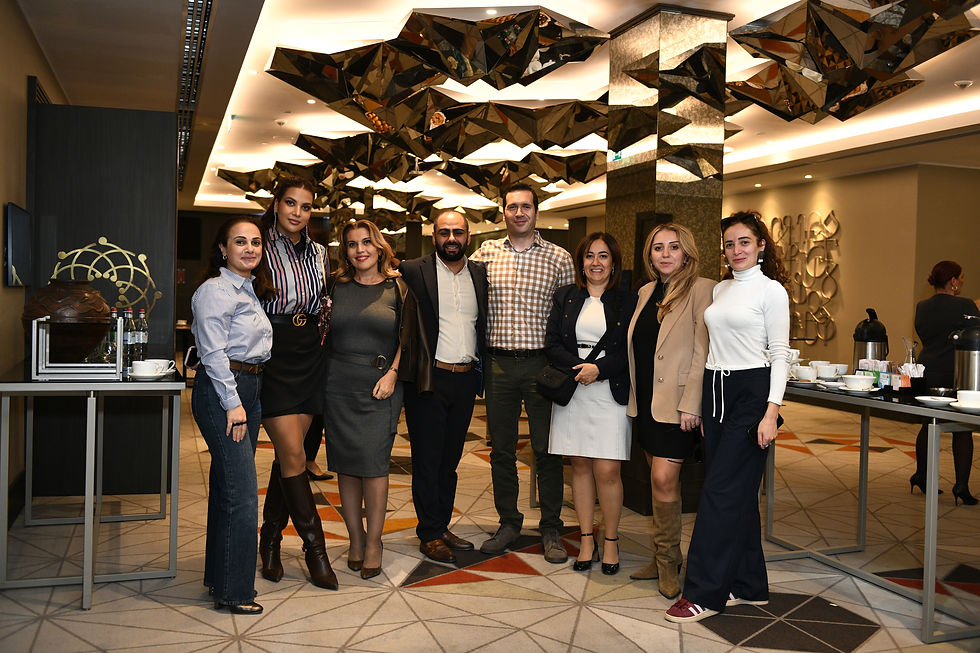The hidden bottleneck: Why Armenia's economic growth depends on people, not markets
- Sep 16, 2025
- 6 min read
Updated: Sep 17, 2025
ChangeSchool research in partnership with the British Embassy Yerevan and British Council Armenia
Armenia's economy is gaining momentum. In 2024, GDP grew by 5.9%, followed by a further 7% increase in economic activity during the first half of 2025. The technology sector alone contributed over $2.3 billion. Global firms such as Microsoft, Synopsys, and Cisco have established a presence, reflecting international confidence in Armenia's economic trajectory.
But behind this progress lies a quieter, less visible challenge. While Armenia has solved yesterday's problems, infrastructure bottlenecks and capital shortages, it's now facing tomorrow's crisis: gaps in leadership, talent, and human capital. These constraints represent a bottleneck that, left unaddressed, could limit Armenia's long-term competitiveness.
The brutal reality? Armenian firms are turning down international contracts not because they lack technology or funding, but because they lack the personnel to deliver.
High-performing engineers are failing as managers
Succession planning is nonexistent in most companies
Digital transformation projects are stalling due to human resistance, not technical barriers
Cross-cultural skills needed for global expansion are virtually absent
This isn't just a human resources problem; it's an existential threat to Armenia's economic future.
To explore this further, ChangeSchool conducted joint research with the British Embassy Yerevan and British Council Armenia to understand what's blocking business growth, and what can be done about it.
We spoke to 18 of Armenia's leading organisations across banking, technology, manufacturing, and services. These included Acba Bank, Digitain, InecoBank, SoftConstruct, and Viva. Participants took part in structured interviews and a collaborative workshop in Yerevan.
The two research questions that we asked the organisations were:
What are the biggest people challenges Armenian firms face as they scale?
What capabilities are needed to support international growth?

The findings were consistent. Organisations faced a similar, complex set of people challenges that were limiting their ability to grow sustainably and compete internationally.
Nine challenges limiting Armenia's growth
Our research identified nine interconnected people challenges facing Armenian firms. These are not isolated issues, but part of a wider pattern of organisational capability gaps that require coordinated action.
1. Succession planning is reactive, not strategic.
Most organisations lack structured approaches to leadership succession. Replacement decisions are often made only when a role becomes vacant, leaving firms exposed to risk and instability. Planning for future leadership is rarely integrated into wider business strategy.
"We can't wake up one day and find we have no one to replace a key leader," said one participant.
2. Recruitment and retention are becoming harder.
While Armenia's talent pool is growing, it remains limited in scale. Roles requiring specialist expertise, particularly in areas such as AI and big data, are challenging to fill. Once hired, employees often face unclear job roles and limited career development opportunities, leading to high turnover.
3. Technical experts struggle in management roles.
High-performing technical staff are often promoted into leadership positions without the necessary training or support. Many new managers lack experience in delegation, coaching, and performance feedback, resulting in disengaged teams and inconsistent performance.
4. Performance management lacks clarity and consistency.
Many firms operate without clear or consistent systems for measuring individual and team performance. KPIs often shift year to year, and job descriptions are vague or outdated. This makes it challenging to identify high performers, manage underperformance, or align individuals with the strategy.
5. Digital transformation is seen as a technology challenge.
Digital capability gaps persist across organisations. While new systems are being introduced, adoption is slow, driven by limited digital confidence among staff and, at times, senior leaders. Communication around digital change is often unclear, fuelling uncertainty and resistance.
6. Change management remains an underdeveloped capability.
Change is often approached as a one-off event rather than an ongoing process. Without a structured approach to managing change, organisations face resistance, especially in hierarchical cultures where concerns are rarely voiced openly. The Transtheoretical Model (Prochaska & DiClemente, 1983) offers a useful framework for guiding people through personal and organisational change.
7. Communication and feedback skills need development.
Many leaders and managers lack the skills and confidence to provide clear, timely feedback. Communication is often reactive and top-down, limiting opportunities for learning, innovation, and continuous improvement.
8. Cross-cultural capability is underdeveloped.
As Armenian companies enter new markets and collaborate internationally, cross-cultural leadership and communication skills are becoming increasingly important. Yet few organisations are actively developing these capabilities, limiting the effectiveness of international partnerships and global teams.
9. Local training provision is inconsistent.
While the learning and development ecosystem in Armenia is expanding, quality and relevance vary widely. Many organisations struggle to find training partners who offer programmes aligned to business needs, particularly in leadership, coaching, digital, and change management.

A call to action: Build people to build growth
The evidence is clear: Armenia's economic progress will only be sustained if organisations invest intentionally in leadership, people systems, and the human side of growth.
Based on our research with 18 leading Armenian organisations, we recommend that companies focus on five strategic priorities:
1. Build Strategic Talent Pipelines
Most Armenian firms lack structured succession planning and struggle when technical experts are promoted to management without proper support, resulting in team dysfunction and turnover. Organisations must identify high-potential individuals 2-3 years before they're needed, map critical roles with potential successors, and implement comprehensive "first-time manager" programmes covering delegation, performance conversations, and conflict resolution.
2. Establish Clear Performance and Retention Systems
Ad-hoc performance management and unclear career paths are driving talented employees to leave Armenian companies when retention is more cost-effective than recruitment. Create structured performance systems with measurable outcomes, implement quarterly reviews that connect individual contributions to the business strategy, and conduct regular "stay interviews" to address concerns before they become triggers for resignation.
3. Develop Digital and Change Capabilities
Digital transformation failures stem from user resistance and poor change management rather than technical problems, while Armenia's hierarchical culture means resistance often goes unspoken until it becomes a crisis. Provide digital literacy training for all employees, including leadership, train managers in systematic change management methodologies, and establish formal communication strategies with two-way feedback mechanisms.
4. Strengthen Communication and Cross-Cultural Skills
Poor communication practices limit innovation and reduce engagement, while a lack of cross-cultural competence restricts international expansion and the effectiveness of collaboration. Implement communication skills training for all managers, focusing on feedback delivery, establish structured team meetings that encourage input from all levels, and provide cultural awareness training for teams working internationally.
5. Create Strategic Learning Partnerships
Many Armenian organisations struggle to find quality training providers that understand their specific challenges and deliver measurable results in areas like leadership and change management. Evaluate providers based on their track record with similar companies and customisation ability, establish long-term relationships rather than transactional purchases, and measure success through behaviour change rather than just participant satisfaction.
The Integration Imperative
These challenges are interconnected, and so are the solutions. The most successful organisations will be those that act early, build capability systematically, and recognise that people, not just markets, are the engine of sustainable growth.
Start with succession planning and performance management as your foundation, then layer in the other capabilities over 12-18 months. The organisations that address these people challenges proactively will be best positioned to capture Armenia's next wave of economic growth.
About ChangeSchool
ChangeSchool believes elite education is for everyone. We support organisations to grow leadership capability, scale sustainably, and build cultures that thrive through change. We operate at the intersection of higher education, organisational development, and global leadership.
This research reflects our commitment to helping organisations turn insight into action, at scale, with impact, and in partnership.
To explore how we can support your organisation in Armenia or beyond, visit: www.changeschool.org/executive-education
ChangeSchool London is a Global award-winning Executive Education Delivery partner | Entrepreneurship education provider for Top Accelerators | Delivering Next-Generation EMBA Programmes. We have delivered education in 39 countries.
ChangeSchool’s methodology for turning knowledge into action has been recognised as world-leading, earning the 2025 EFMD EiP global silver award for ecosystem development and the 2025 Merit Awards special recognition for impactful cross-institutional collaboration.
References
Prochaska, J.O., & DiClemente, C.C. (1983). Stages and processes of self-change of smoking: Toward an integrative model of change. Journal of Consulting and Clinical Psychology, 51(3), 390–395.
World Bank (2025). Armenia Economic Update: Growth and Human Capital
International Labour Organisation (ILO). Skills for Employment Policy Briefs – Eastern Europe
OECD (2024). Armenia: SME and Entrepreneurship Policy Review
McKinsey & Company (2024). How to manage talent in a growth economy
Deloitte Insights (2025). Global Human Capital Trends: Navigating the Future of Work
Harvard Business Review (2024). Performance Management That Works: Aligning People and Strategy
Be part of our growing community of innovators and leaders



